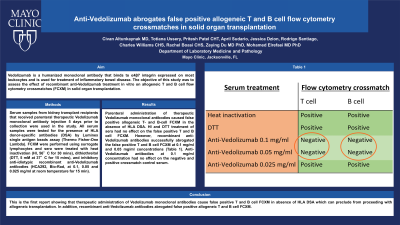P205: Anti-Vedolizumab abrogates false positive allogeneic T and B cell flow cytometry crossmatches in solid organ transplantation
(P205) Anti-Vedolizumab abrogates false positive allogeneic T and B cell flow cytometry crossmatches in solid organ transplantation

- CA
Poster Presenter(s)
Aim: Vedolizumab is a humanized monoclonal antibody that binds to α4β7 integrin expressed on most leukocytes and is used for treatment of inflammatory bowel disease. The objective of this study was to assess the effect of recombinant anti-Vedolizumab treatment in vitro on allogeneic T and B cell flow cytometry crossmatches (FCXM) in solid organ transplantation.
Method: Serum samples from kidney transplant recipients that received parenteral therapeutic Vedolizumab monoclonal antibody injection 5 days prior to collection were used in the study. All serum samples were tested for the presence of HLA donor-specific antibodies (DSA) by Luminex single antigen beads assay (Thermo Fisher-One lambda). FCXM were performed using surrogate lymphocytes and sera were treated with heat inactivation (HI, 56°C for 30 mins), dithiothreitol (DTT, 5 mM at 37°C for 15 mins), and inhibitory anti-idiotypic recombinant anti-Vedolizumab antibodies (HCA292, Bio-Rad, at 0.1, 0.05 and 0.025 mg/ml at room temperature for 15 min).
Results: Parenteral administration of therapeutic Vedolizumab monoclonal antibodies caused false positive allogeneic T- and B-cell FCXM in the absence of HLA DSA. HI and DTT treatment of sera had not effect on the false positive T and B cell FCXM. However, recombinant anti-Vedolizumab antibodies successfully abrogated the false positive T and B cell FCXM at 0.1 mg/ml and 0.05 mg/ml concentrations (Table 1). Anti-Vedolizumab antibodies at 0.1 mg/ml concentration had no effect on the negative and positive crossmatch control serum.
Conclusion: This is the first report showing that therapeutic administration of Vedolizumab monoclonal antibodies cause false positive T and B cell FCXM in absence of HLA DSA which can preclude from proceeding with allogeneic transplantation. In addition, recombinant anti-Vedolizumab antibodies abrogated false positive allogeneic T and B cell FCXM.
Method: Serum samples from kidney transplant recipients that received parenteral therapeutic Vedolizumab monoclonal antibody injection 5 days prior to collection were used in the study. All serum samples were tested for the presence of HLA donor-specific antibodies (DSA) by Luminex single antigen beads assay (Thermo Fisher-One lambda). FCXM were performed using surrogate lymphocytes and sera were treated with heat inactivation (HI, 56°C for 30 mins), dithiothreitol (DTT, 5 mM at 37°C for 15 mins), and inhibitory anti-idiotypic recombinant anti-Vedolizumab antibodies (HCA292, Bio-Rad, at 0.1, 0.05 and 0.025 mg/ml at room temperature for 15 min).
Results: Parenteral administration of therapeutic Vedolizumab monoclonal antibodies caused false positive allogeneic T- and B-cell FCXM in the absence of HLA DSA. HI and DTT treatment of sera had not effect on the false positive T and B cell FCXM. However, recombinant anti-Vedolizumab antibodies successfully abrogated the false positive T and B cell FCXM at 0.1 mg/ml and 0.05 mg/ml concentrations (Table 1). Anti-Vedolizumab antibodies at 0.1 mg/ml concentration had no effect on the negative and positive crossmatch control serum.
Conclusion: This is the first report showing that therapeutic administration of Vedolizumab monoclonal antibodies cause false positive T and B cell FCXM in absence of HLA DSA which can preclude from proceeding with allogeneic transplantation. In addition, recombinant anti-Vedolizumab antibodies abrogated false positive allogeneic T and B cell FCXM.
